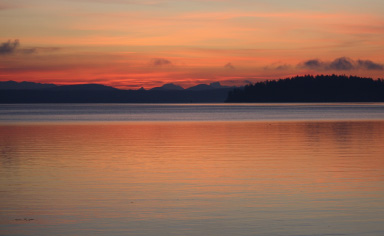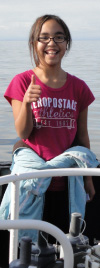A priority for Dr. Jude Apple and his partners – Dr. Jan Newton, COSEE Pacific Partnerships and the National
Science Foundation - is to work toward more effective engagement of Native American communities in science.
Before Jude took on his role with COSEE he was working at the
Northwest Indian College (NWIC), located on the Lummi
Reservation next to Bellingham Bay. His research is what brought him there – he was drawn to Bellingham Bay
because of his interest in hypoxia. For the Lummi people, what was happening in Bellingham Bay was also of great
interest, as it was affecting their food supplies. As Jude began teaching at NWIC and engaging his students in
his research, he began a process of learning Native perspectives on scientific knowledge.
The Lummi culture relies on aquatic and fisheries resources, a sense of place and of belonging that needs to be
preserved – it's what it means to be Lummi. "This has really made me look at why I am asking the research
questions I am asking, and has given me a greater sense of purpose," says Jude. "I'm not just figuring out what
are the biogeochemical processes that influence water quality – I actually might help figure out how to preserve
the resources and the culture, and how to contribute within the Lummi value system." Using Lummi cultural
values – such as salmon, water quality, and a holistic approach to natural ecosystems – Jude works to make Western
science more accessible to Native students in a way that honors indigenous knowledge. He asks his NWIC
students – How does your research connect to or support your cultural values? "I can say we need to study
hypoxia, but for their studies to be relevant it has to come from them," he says, asking them, "How does it all
fit into your understanding of the natural world and promoting the values of your people?"
Jude is also collaborating on a project funded by the NSF
Opportunities for Enhancing Diversity in Geosciences (OEDG)
program, working specifically to bring together Western and Native science perspectives in marine science
curriculum as part of the NWIC
Native Environmental Science Program.
"If I achieve my goal at Northwest Indian College, one day I won’t be needed there." |
Today, the resource managers and administrators working on Native lands tend to be white, Western-trained
scientists. But Jude is working with a cohort of students who soon will be moving into these positions – as
Resources Manager, Water Quality Specialist, or Fisheries Manager. Gradually, over time, Native Americans with
science training within the context of Native cultural values will be managing their own ancestral aquatic
resources and mentoring other students to do the same. In this regard, Jude is trying to teach his way out of a
teaching position.




